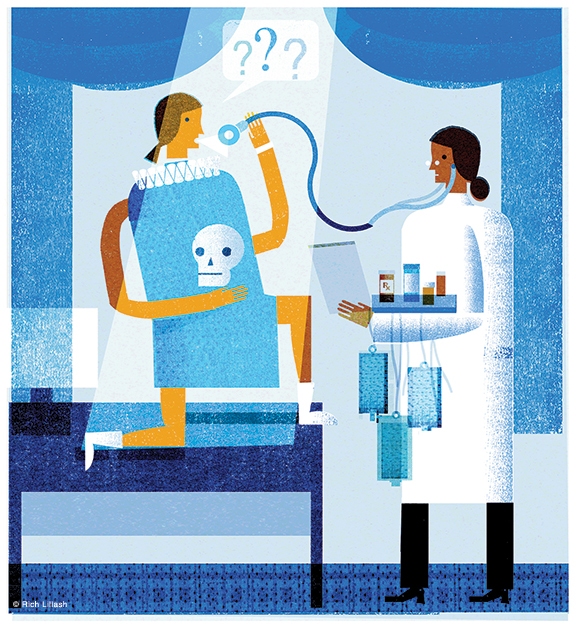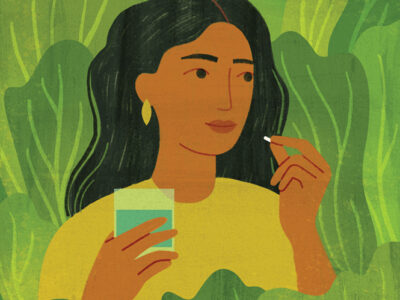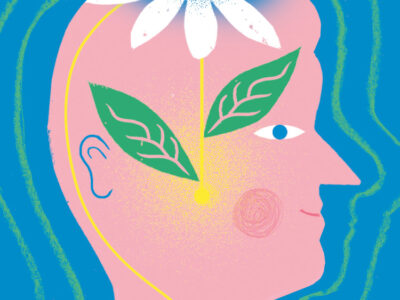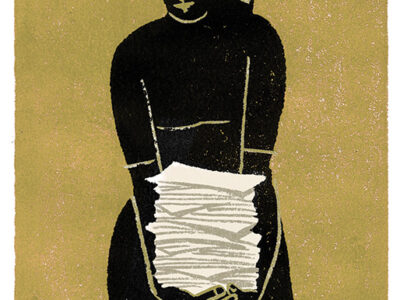
Let every eye negotiate for itself and trust no agent.
BY KARA DADDARIO BOWN
I learned the most important lesson of my life in English Seminar 336: Introduction to Shakespeare, taught by Professor Emerita Phyllis Rackin. The only way we could ever understand Shakespeare, she would tell us, spryly lifting herself out of her chair, was to say his lines aloud. So our class was fashioned after Dead Poets Society. We passed our time together standing on tables and chairs, lying on the floor, becoming Puck, Lady Macbeth, Othello, and Mercutio, speaking in poetic tongues and exhaling the Bard in every breath.
O Captain! my Captain, Phyllis! I still remember the class when Dr. Rackin taught us something that would save my life not once but twice.
We were gathered in a circle of desks as soft light entered the room through the tall glass window panes and warmed my back. It has been a decade since I heard her words, so I’m taking the liberty to paraphrase, but she said: You will read many things, written by people with authority, in publications with authority, but it doesn’t mean you must believe every word on the page. Question, analyze, formulate your own opinion. You are smarter than you think you are.
I haphazardly applied this advice throughout my 20s, but it wasn’t until I found out I had cancer, when the stakes became life and death, that the power of the query revealed itself to me.
The worst part of any cancer diagnosis is waiting for the pathology report from a biopsy. I imagine the same looming feeling is true of any test that will determine your odds. A mass near my heart and aorta had been discovered at a local hospital during a scan. I remember the doctor’s face as he delivered the news, the sympathetic touch of his hand on mine, before my husband held my shaking body. Time protracted in the weeks after the tumor was found, exacerbated by long days spent thinking about how I was no longer in control of my body.
I was no longer in control of anything. Doctors and friends shared words of encouragement, reminding me there was still a chance the tumor was benign. Go to your bosom: knock there and ask your heart what it doth know. I couldn’t admit to anyone what I already knew, what I didn’t need a report to tell me. I was sick. The painful waiting ended abruptly when I received a call detailing the pathology report: definitively, unequivocally, Hodgkin’s lymphoma. I wasted time and now doth time waste me. I spent the following days in an aura of disbelief. I was 30 and I had cancer. I had plans, and I thought I had more time. I wasn’t prepared for this.
I gave way to every dark and pessimistic thought about what it meant to have cancer. In this moment of health crisis, despite wanting to start treatment the minute I found out I was sick, I had to know if my diagnosis was correct. So, I took my biopsy to another research institution in the Philadelphia area. When the oncologist at the hospital gave my biopsy slides to the pathology team, I was plagued by a different anticipation, waiting for them to confirm my diagnosis. The report returned days later, however, was different: it could be Hodgkin’s lymphoma, but the nature of the biopsy precluded a definitive diagnosis.
The report essentially said, maybe but maybe not. Before I poisoned myself, I wanted to know what we were trying to cure. The oncology team mentioned additional tests that could be run, but they cautioned that they would be surprised if the results revealed anything different than my original diagnosis. I insisted I had to know. I insisted that I could wait.
On a bright, cold Sunday morning, as I walked underneath a canopy of barren cherry trees in the Morris Arboretum, my phone rang. I knew from the number on the screen it was the oncologist, and I answered hesitantly. All I remember from the conversation were his words, “the team was really surprised,” and the question they prompted me to ask: Did this mean I had less of a chance to live?
I stared for a long time at the tree limbs above me, watching branches sway in the gentle wind, before I could call my husband. I had non-Hodgkin’s lymphoma. What’s in a name? Only a different cancer, with different protocols and different drugs used for treatment. When I received the final pathology report, I felt the weight of sadness, anger, and fear in every part of my body. But eventually I felt lucky. If I hadn’t asked a question—if I’d accepted the words on the page—I might have been treated for a malignancy I never had.
My treatment began on Valentine’s Day. I watched my husband, who sat in an uncomfortable wooden chair across from me in the infusion room, and thought about how different I wished things could be. I reclined below IV bags, which hung from a metal pole like leaves on a tree. We had plans. We weren’t prepared for this. If wishful thinking contained as much power as the drugs I was about to receive, I think I could have willed my cancer away.
I had prepared myself for treatment the week before, and quelled my anxiety, by paging through studies about non-Hodgkin’s lymphoma. Let every eye negotiate for itself and trust no agent. From the literature, I was told my chemotherapy would be calculated from my height and weight to ensure accurate dosing. An oncology nurse in blue scrubs entered my room and asked if I was ready to begin. I had no choice. But before we started, I asked her if she could read the various dosages I would be receiving. As she lifted the IV bags and rattled off laborious and foreign drug names, my husband wrote down each medication and the dosage. When she finished, I asked her if she would check the height and weight listed in my chart.
She happily obliged. My chemo, she told me, was calculated from my height: five feet tall. We all looked at each other—I’m five six. The nurse looked wide-eyed at my chart, then turned the computer screen to face us. The chart contained a multiyear plateau of my height, followed by a dramatic drop to five feet on my last visit. Expressing her concern, she left the room to make a prompt correction to my medications. I have dwelled on this moment many times since my treatment, often wondering what I owe to a simple question.
During treatment, I called and emailed my medical team with every single question I had. Even when the question seemed inconsequential, even when it made me feel foolish, I asked. The lady doth protest too much. And I’m glad I did. Every question was met with kindness and reassurance from a dedicated team of professionals, who never seemed to mind providing an answer or checking one more time.
I realized during my treatment that medicine is a complicated mix of science and humanity. Although it may not be easy when faced with an illness, especially one that may be beyond comprehension, patients have a duty to advocate. I didn’t know, sitting in a classroom in Fisher-Bennett Hall in my early 20s, that I would learn a lesson that would alter how I saw the world. I didn’t know that the power of my own mind would become my most valuable tool. Dr. Rackin taught me that it is our right to question and it is our obligation, as human beings, to think critically about what is presented to us. Men at some time are masters of their fates.
Kara Daddario Bown C’08 lives in Blue Bell, Pennsylvania.




